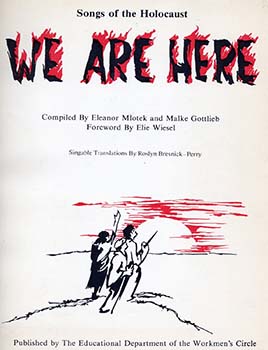Song written in the Vilno ghetto by Leah Rudnicki, born in Kalvarija, Lithuania in 1916. Rudnicki was a member of the editorial stall of the newspaper Vilner emes. As a partisan she was caught by the Gestapo and deported to Majdanek in September 1943. The words were set to an earlier Yiddish song S’iz keyn broyt in shtuh nishto (words by lzi Charik, music by Leyb Yampolski).

Birds sit drowsing on the branches,
Sleep, my precious child.
By your cradle in your little nest
Sings a stranger by your side:
Lu-Lu, Lu-Lu, Lu.
Here your cradle had its dwelling
Laced with happiness in store,
And your mother, Oh, your mother,
Will return no more.
Lu-Lu, Lu-Lu, Lu.
I have seen your father running
Under hails of stone,
Flying over fields there echoed
His desolated moan.
Lu-Lu, Lu-Lu, Lu.
Dremlen feygl af di tsvaygn,
Shlof, mayn tayer kind.
Bay dayn vigl, af dayn nare
Zitst a fremde un zingt:
Lyu-lyu, lyu-lyu, lyu.
S’iz dayn vigl vu geshtanen
Oysgeflokhtn fun glik.
Un dayn mame, oy dayn mame,
Kumt shoyn keyn mol nit tsurik.
Lyu-lyu, lyu-lyu, lyu.
Kh’hob gezen dayn tatn loyfn
Unter hogl fun shteyn,
lber felder iz gefloygn
Zayn faryosernter geveyn.
Lyu-lyu, lyu-lyu, lyu.
דרעמלען פֿײגל אױף די צװײַגן,
שלאָף, מײַן טײַער קינד.
בײַ דײַן װיגל אױף דײַן נאַרע
זיצט אַ פֿרעמדע און זינגט:
ליו־ליו, ליו־ליו, ליו.
ס׳איז דײַן װיגל װוּ געשטאַנען,
אױסגעפֿלאָכטן פֿון גליק,
און דײַן מאַמע, אױ דײַן מאַמע,
קומט שױן קײן מאָל ניט צוריק.
ליו־ליו, ליו־ליו, ליו.
כ׳האָב געזען דײַן טאַטן לױפֿן
אונטער האָגל פֿון שטײן,
איבער פֿעלדער איז געפֿלױגן
זײַן פֿאַריתומטער געװײן.
ליו־ליו, ליו־ליו, ליו.
Song Title: Dremlen Feygl Af Di Tsvaygn

Compiled by sisters Malke Gottleib and Chana Mlotek, this collection of 40 songs, issued on the occasion of the 40th anniversary of the Warsaw Ghetto Uprising, reflects the suffering, despair, longing, as well as the strength, hope and courage that led the last remnant of enfeebled Jews to take up arms against the mammoth Nazi war-machine. Save for five songs, this compilation comprises songs that were actually written or sung in the ghettos and concentration camps. Four exceptions written after the war: “Babi Yar,” “Moyshelekh un Shloymelekh,” “Kadish,” and “Mayn mame hot gevolt zayn oyf mayn khasene” are often presented at commemorative gatherings and were therefore included. The fifth song “Am Yisroel Khay” was written in a D.P. camp and is an affirmation of the will of the survivors to build new lives for themselves, holding high their belief in the endurance of the Jewish people. To enable readers and singers not conversant with the Yiddish alphabet to utilize this collection, We Are Here! Songs of the Holocaust provides parallel transliterations and singable English translations by Roslyn Bresnick Perry.